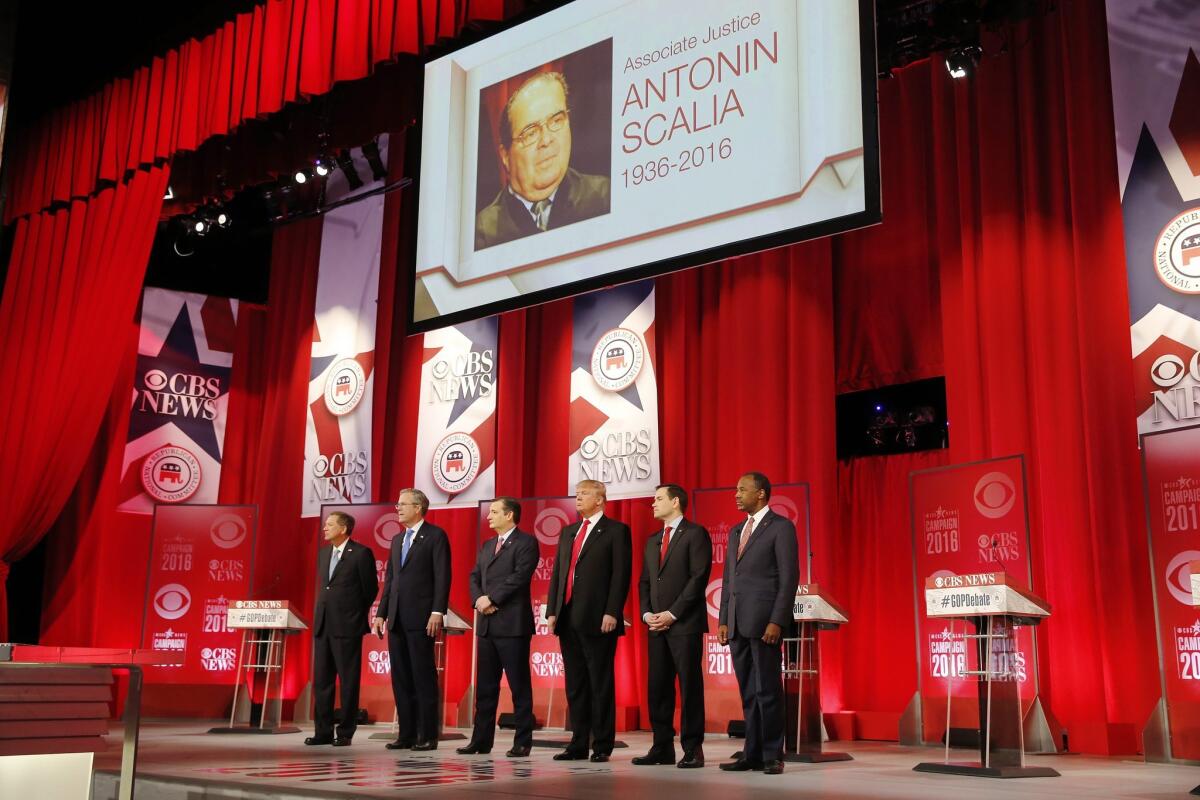Opinion: Republicans find a ‘precedent’ limiting Obama’s post-Scalia nominating power

John Kasich, Jeb Bush, Ted Cruz, Donald Trump, Marco Rubio and Ben Carson take the stage beneath an image of U.S. Supreme Court Justice Antonin Scalia, who died earlier in the day.
It didn’t take Republican presidential candidates long to reach a rough consensus on whether the Senate should confirm a successor to Supreme Court Justice Antonin Scalia this year.
Their answer: Not if President Obama is the one who gets to choose the new justice.
“This should be a decision for the people. If the Democrats want to replace this nominee, they need to win this election,” Sen. Ted Cruz (R-Texas) said on ABC’s “This Week” on Sunday.
SIGN UP for the free Opinion newsletter >>
In the GOP debate on Saturday, Cruz and Sen. Marco Rubio (R-Fla.) both suggested that the president would be flouting precedent if he insisted on nominating a new justice during his final, lame duck year in office.
“It’s been over 80 years since a lame duck president has appointed a Supreme Court Justice,” Rubio said.
Well, kind of. Ronald Reagan nominated Justice Anthony Kennedy just before his last year in office, in late 1987; Kennedy was confirmed by the Senate in 1988.
There’s nothing in the Constitution that limits a president’s prerogatives during his last 12 months in the White House. There’s nothing that even hints at such a principle. If there were, we might have legislation limiting a lame duck president’s power to start a war, let alone nominate a Supreme Court justice. We don’t.
The “precedent” Cruz and Rubio discovered – leaving aside the irony of conservative originalists discovering a new rule – is really one part happenstance (lame duck presidents don’t often get a chance to nominate justices) and one part politics.
The senator-candidates are trying to elevate a straightforward political position – their desire to stop Obama from naming a new justice – into a question of reverence for a hitherto-unnoticed tradition. You can’t blame them for trying.
But it’s still Obama’s prerogative to nominate a new justice, which he says he will do “in due time.” It’s still the Senate’s prerogative to confirm the nomination – or not. It remains the voters’ prerogative to decide which side has the better argument.
And unlike the senators’ newfound lame-duck rule, all those prerogatives are actually in the Constitution.
MORE ON SCALIA
When Scalia was found, ‘He was in perfect repose ... as if he was taking a nap’
Supreme Court Justice Antonin Scalia dies at 79; fiery conservative fought liberalism’s tide
From the archives: Scalia takes oath and Rehnquist sworn in as Chief Justice
More to Read
Sign up for Essential California
The most important California stories and recommendations in your inbox every morning.
You may occasionally receive promotional content from the Los Angeles Times.











